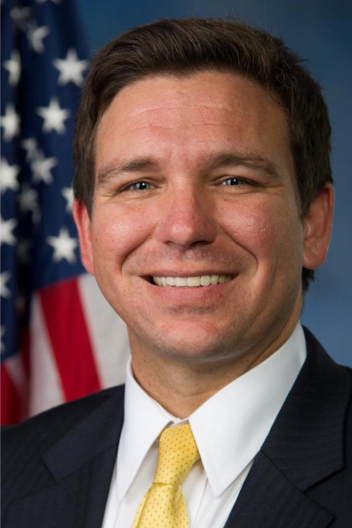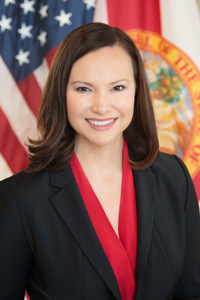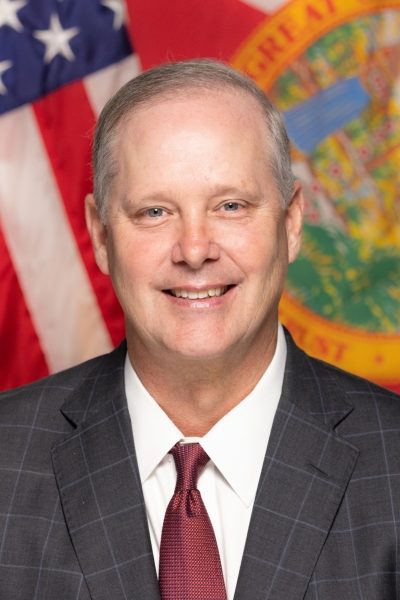
The executive branch of Florida’s government is headed by an elected governor and three independently elected cabinet members: an attorney general, a chief financial officer, and a commissioner of agriculture. There is also a lieutenant governor who has very limited constitutional responsibilities.
This “plural executive” structure divides executive power among four public officials, and on matters that come collectively before the governor and cabinet, each cabinet member has equal footing with the governor. Cabinet members are not required, constitutionally, to capitulate to the governor’s wishes. This form of government is in contrast with a unitary executive structure, in which one person holds all executive authority and chooses all cabinet members. It reflects a reconstruction-era concern about a single person having too much power.
Executive Branch Functions
The functions of the executive branch are allotted among several departments. Each department is directly supervised by the governor, an officer or board appointed by the governor, a cabinet member, or collectively by the governor and cabinet, as shown in this organizational chart:

The Governor

The governor is the chief executive and chief administrative officer of the Florida government and the commander-in-chief of the state’s military forces.
Florida’s current governor is Ron DeSantis.
The governor’s responsibilities include:
- Execute Florida’s laws. May initiate judicial proceedings in the name of the state against any state, county, or municipal officer to enforce compliance with any duty or restrain any unauthorized act.
- Annually prepare a state budget for submission to the legislature.
- Approve or disapprove (veto) acts passed by the legislature. May veto specific items (line-item veto) in a general appropriation bill. (The legislature may override a veto by a two-thirds vote of each house.)
- Deliver a “State of the State address” to the legislature at least once per session.
- Recommend measures in the public interest. May call the legislature into special session.
- Fill by appointment any vacancy in state or county office for the remainder of the term of an appointive office and for the remainder of the term of an elective office if it is less than twenty-eight months.
- Commission all officers of the state and counties.
In addition, the governor is responsible for the following executive branch entities:
The Lieutenant Governor

Florida’s current lieutenant governor is Jeanette Nuñez.
In the event of a vacancy in the office of governor, the lieutenant governor becomes governor. The constitution assigns no other responsibilities to the lieutenant governor except those given by the governor or otherwise provided by law.
See Art. IV, §2 — 3, Fla. Const.
The Attorney General

The Attorney General is the state’s chief legal officer.
Florida’s current Attorney General is Ashley Moody.
The Office of the Attorney General:
- defends the state in civil litigation cases.
- represents the people of Florida in criminal appeals in state and federal courts.
- operates consumer protection programs and victim service programs.
- prosecutes some criminal offenses.
- investigates Medicaid fraud.
The Attorney General may also challenge federal actions based on federalism principles and defend state laws and enforcement actions against claims that they overstep the state’s role in our federal system.
For more, see OPPAGA.
The Chief Financial Officer

The Chief Financial Officer (CFO) heads the Department of Financial Services and serves as the State Fire Marshall.
Florida’s current CFO is Jimmy Patronis.
The Department of Financial Services:
- ensures that businesses have workers’ compensation coverage in place for employees;
- investigates fraud, including securities and insurance fraud;
- licenses and oversees insurance agents and agencies;
- monitors the investment of state funds and manages the deferred compensation program for state employees;
- oversees cemeteries and funeral homes; and
- oversees the state’s accounting and auditing functions and unclaimed property.
As Fire Marshall, the CFO oversees a Division that provides fire-related training, education, and services throughout the state.
For more, see OPPAGA.
The Commissioner of Agriculture

The Commissioner of Agriculture heads the Florida Department of Agriculture and Consumer Services. Florida’s current Commissioner of Agriculture is Wilton Simpson.
The Department supports and promotes Florida agriculture, protects the environment, safeguards consumers, and ensures the safety and wholesomeness of food.
Among other programs and activities, the Department:
- protects Florida’s livestock, honey bees, and crop plants from pests and diseases;
- manages over a million acres of state forest land for multiple uses, including timber, wildlife habitat, and recreation;
- acts as the state’s clearinghouse for consumer concerns, whose call center analysts answer questions, provide information, and help resolve complaints; and
- tests for toxins, allergens, chemical contaminants, pesticide residues, food additives, and fraudulent formulations in food samples.
For more, see OPPAGA.
Collective Decision-Making
Collectively, the governor and cabinet head four executive branch departments: the Department of Highway Safety and Motor Vehicles, the Department of Veterans Affairs, the Florida Department of Law Enforcement, and the Department of Revenue.
They also collectively serve as members of the State Board of Executive Clemency, the Financial Services Commission, and several other boards and commissions that address state lands, state investments, and rules pertaining to insurance and financial regulation.
When the governor and the cabinet sit as a decision-making body, the governor serves as chair. When a tie vote occurs, the side on which the Governor voted prevails.
Elections, Qualifications, Terms, and Compensation

The governor and lieutenant governor, as a team, and each cabinet member are elected on a partisan ballot in statewide elections in November of even-numbered years not divisible by four (i.e., during the midterm elections). Their term of office is four years, with a two-term limit.
Candidates must have the legal right to vote in the state, be at least 30 years old, and have lived in Florida for seven years. The attorney general must also have been a member of the Florida Bar for the preceding five years.
In primary elections, candidates for governor may run without a lieutenant governor candidate. In the general election, governor and lieutenant governor candidates form joint candidacies so that voters cast a single vote for a combined ticket.
The legislature sets the salaries for the governor, lieutenant governor, and cabinet members. The current salary for the governor is $141,400. The salary for the cabinet members is $139,988.
For More Information
- Florida’s Cabinet System: Y2k and Beyond, by Edwin A. Bayo and Kent J. Perez, Florida Bar Journal, November 2000
- Florida lawmakers give Gov. Ron DeSantis more power over agency appointments, WFSU Public Media, 3/11/22
- One Chief Executive or Many? in Who Decides? States as Laboratories of Constitutional Experimentation by Jeffrey S. Sutton, October 2021
- Bill Analysis and Fiscal Impact Statement, CS/SB 1658 — Executive Appointments — The Florida Senate, 2/1/22
- The Same River Twice: A Brief History of How the 1968 Florida Constitution Came to Be and What it Has Become, by Mary E. Adkins, University of Florida Levin College of Law, 2016
I hope this primer post was informative. Thank you for wanting to be a more informed voter.
